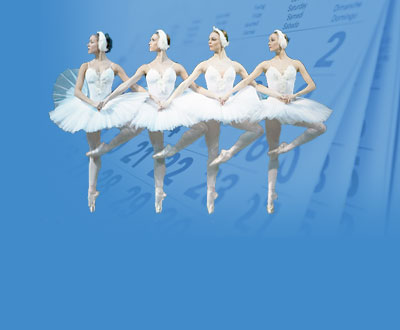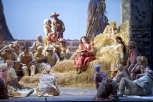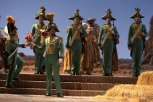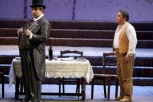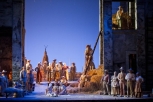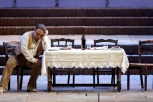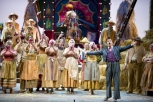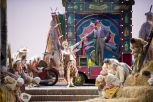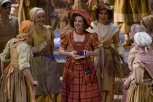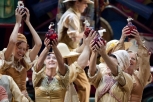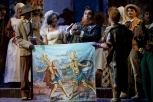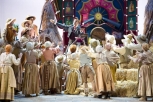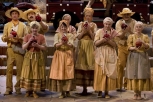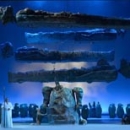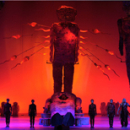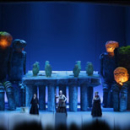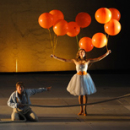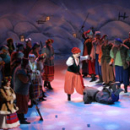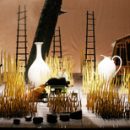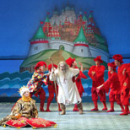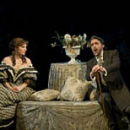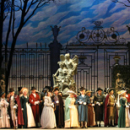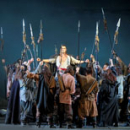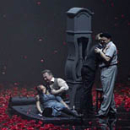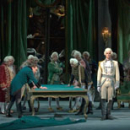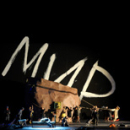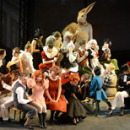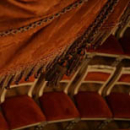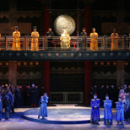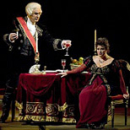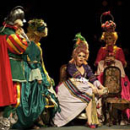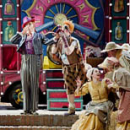Schedule of all St. Petersburg theaters on
one page >>
Please enter theatre's name, actor's name or any other keyword
L'elisir d'amore (Mikhailovsky Theatre, opera)
Genre: Opera Age restriction: 12+ Length: 2 hours 40 minutes
Credits
Libretto by Felice Romani based on the French libretto by Eugène Scribe
Stage Director: Fabio Sparvoli
Stage Designer: Mauro Carosi
Costume Designer: Odette Nicoletti
Lighting Designer: Vinicio Cheli
Assistant to Stage Director: Barbara Di Lieto
Assistant to Costume Designer: Luigi Benedetti
Musical Director of the production: Daniele Rustioni
Artistic Director and Principal Conductor of the Chorus: Vladimir Stolpovskikh
Principal Pianist: Marc Vayner
Chorus Masters: Alexey Dmitriev, Sergey Tsyplenkov
Director: Vyacheslav Kalyuzhny
Consultant in the Italian language: Daria Mitrofanova
Surtitles: Margarita Kunitsyna-Tankevich
Stage Manager: Olga Kokh
Sets and costumes produced at the Vozrozhdenie Theatrical Design Studios
Premiere of the production: 27 May 2008
Even when the prima donna is German, the tenor stammers, and the basso buffo bleats like a goat, a masterpiece can be born, and that’s how Gaetano Donizetti’s L’elisir d’amore first saw the light of the day in 1832. Felice Romani wrote the Italian libretto, after Eugène Scribe’s libretto for Daniel Auber’s Le philtre (1831). Shy and poor Nemorino has no chance with popular and rich Adina. Especially now that dashing officer Belcore arrived in town! Things change, however, when Dulcamara, with his magic potion, manages to settle all the problems.
Notwithstanding the hurry, the opera turned out wonderfully: the amusing storyline and light melodies created a work that has long been beloved of audiences.
Recommended for family viewing
Peasants of an Italian village are having rest after the farm work. Adina, a pretty country belle, is sitting aside reading a book. The book tells the story of Tristan and Isolde and a wonderful elixir that brings the heart into obsessive passion. A young farmer Nemorino, desperately in love with Adina, is keeping an eye on her.
Belcore, a recruiting sergeant, arrives in the village at the head of a regiment of soldiers. To Nemorino’s horror, Belcore makes a proposal to Adina. The coquette doesn’t know who to choose, as her heart seems to be silent.
A colorful wagon has come to the village — that is Dr Dulcamara, a peripatetic quack, selling different potions and arcana. Nemorino purchases a bottle allegedly containing “the elixir of love”, ordinary wine in reality. Eager to give it a try, Nemorino swallows the magic potion. The effect shows at once. Half-drunk, he flirts with girls making Adina jealous.
Adina, being piqued, declares she will marry Belcore. Nemorino, in despair, seeking Adina’s love wants to buy another bottle of the elixir but he’s short of money. Belcore enlists him in the army and thus Nemorino secures the necessary money. Now he’s able to get the magic elixir.
Gianetta brings stunning news: Nemorino’s uncle has died, leaving him sole heir. Now the young peasant is a desirable date mate. All the girls surround Nemorino with attention, which he thinks is due to the elixir. Its efficacy has been proved — everybody loves him. Adina is jealous but when she learns that Nemorino has sold his freedom to win her, she is deeply moved and realizes she loves him. She buys back his enlistment papers and finally admits her love. The lovers are happy. Dulcamara hasn’t expected such efficacy of his elixir and such fame and promises to come back with new stock of magic potions. Belcore is sure he’ll find another fiancée and leaves the village. The peasants see the sergeant and his soldiers off.
You may also like
-
Ruslan and Lyudmila (Mariinsky II (New) Theatre, opera)
Mariinsky II (New) Theatre- Genre: Opera
-
Il barbiere di Siviglia (Mikhailovsky Theatre, opera)
Mikhailovsky (ex. Mussorgsky) Theatre- Genre: Opera
-
La Cenerentola (Mariinsky Theatre, opera)
Mariinsky (ex. Kirov) Ballet and Opera Theatre- Genre: Opera
-
Das Rheingold (Mariinsky II New Theatre, opera)
Mariinsky II (New) Theatre- Genre: Opera
- Language: German
-
Die Walküre (Mariinsky II New Theatre, opera)
Mariinsky II (New) Theatre- Genre: Opera
- Language: German
-
Siegfried (Mariinsky II New Theatre, opera)
Mariinsky II (New) Theatre- Genre: Opera
- Language: German
-
Götterdämmerung (Mariinsky II New Theatre, opera)
Mariinsky II (New) Theatre- Genre: Opera
- Language: German
-
Don Carlo (Mariinsky II (New) Theatre, opera)
Mariinsky II (New) Theatre- Genre: Opera
- Language: Italian
-
A Christmas Tale (Mariinsky II New Theatre, opera)
Mariinsky II (New) Theatre- Genre: Opera
- Language: Russian (English supertitles)
-
The Love for Three Oranges (Mariinsky Theatre, opera)
Mariinsky (ex. Kirov) Ballet and Opera Theatre- Genre: Opera
- Language: Russian (English supertitles)
-
Christmas Eve (Mariinsky Theatre, opera)
Mariinsky (ex. Kirov) Ballet and Opera Theatre- Genre: Opera
- Language: Russian (English supertitles)
-
The Legend of the Invisible City of Kitezh and the Maiden Fevroniya (Mariinsky II New Theatre, opera)
Mariinsky II (New) Theatre- Genre: Opera
- Language: Russian (English supertitles)
-
The Tale of Tsar Saltan (Mariinsky Theatre, opera)
Mariinsky (ex. Kirov) Ballet and Opera Theatre- Genre: Opera
- Language: Russian (English supertitles)
-
La traviata (Mikhailovsky Theatre, opera)
Mikhailovsky (ex. Mussorgsky) Theatre- Genre: Opera
- Language: Italian
-
La Boheme (Mariinsky II (New) Theatre, opera)
Mariinsky II (New) Theatre- Genre: Opera
-
The Queen of Spades (Mariinsky II New Theatre, opera)
Mariinsky II (New) Theatre- Genre: Opera
- Language: Russian (English supertitles)
-
Attila (Mariinsky II New Theatre, opera)
Mariinsky II (New) Theatre- Genre: Opera
- Language: Italian
-
La Bohème (Mikhailovsky Theatre, opera)
Mikhailovsky (ex. Mussorgsky) Theatre- Genre: Opera
- Language: Italian
-
L'italiana in Algeri (Mariinsky Theatre, opera)
Mariinsky (ex. Kirov) Ballet and Opera Theatre- Genre: Opera
-
The Queen of Spades (Mikhailovsky Theatre, opera)
Mikhailovsky (ex. Mussorgsky) Theatre- Genre: Opera
- Language: Russian (English supertitles)
-
Aida (Mikhailovsky Theatre, opera)
Mikhailovsky (ex. Mussorgsky) Theatre- Genre: Opera
-
War and Peace (Mariinsky II New Theatre, opera)
Mariinsky II (New) Theatre- Genre: Opera
- Language: Russian (English supertitles)
-
Manon Lescaut (Mikhailovsky Theatre, opera)
Mikhailovsky (ex. Mussorgsky) Theatre- Genre: Opera
- Language: Italian
-
Carmen (Mikhailovsky Theatre, opera)
Mikhailovsky (ex. Mussorgsky) Theatre- Genre: Opera
- Language: Russian (English supertitles)
-
Turandot (Mariinsky II New Theatre, opera)
Mariinsky II (New) Theatre- Genre: Opera
- Language: Italian
-
Tosca (Mikhailovsky Theatre, opera)
Mikhailovsky (ex. Mussorgsky) Theatre- Genre: Opera
- Language: Italian
-
Cinderella (Mikhailovsky Theatre, opera)
Mikhailovsky (ex. Mussorgsky) Theatre- Genre: Opera
- Language: Russian
-
Benvenuto Cellini (Mariinsky II (New) Theatre, opera)
Mariinsky II (New) Theatre- Genre: Opera
-
Eugene Onegin (Vasily Barkhatov production at Mikhailovsky Theatre, opera)
Mikhailovsky (ex. Mussorgsky) Theatre- Genre: Opera
- Language: Russian
-
L’elisir d’amore (Mikhailovsky Theatre, opera)
Mikhailovsky (ex. Mussorgsky) Theatre- Genre: Opera
- Language: Italian


 en
en es
es